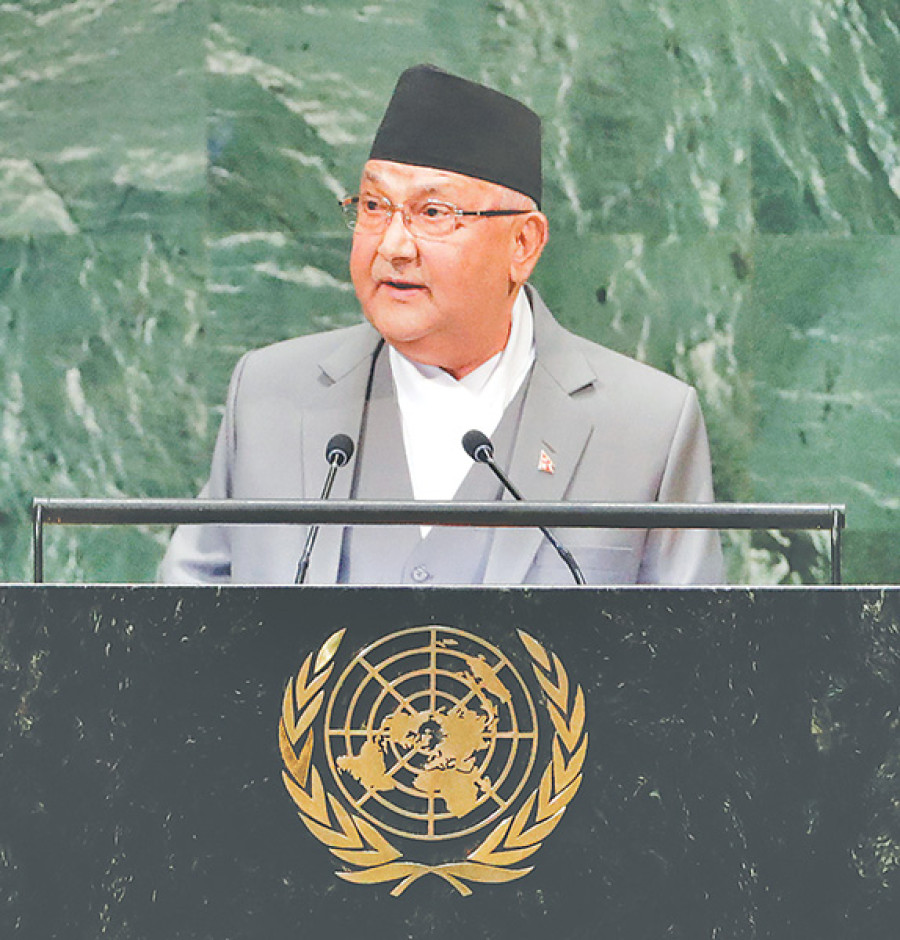National
In UN speech, Oli promises ‘egalitarian and just society’
Prime Minister KP Sharma Oli on Thursday addressed the 73rd session of the United Nations General Assembly in New York, telling the international community that his government, after the successful elections last year, was moving towards creating an egalitarian and just society in Nepal.
Anil Giri
Prime Minister KP Sharma Oli on Thursday addressed the 73rd session of the United Nations General Assembly in New York, telling the international community that his government, after the successful elections last year, was moving towards creating an egalitarian and just society in Nepal.
In his address, the prime minister highlighted the historic political transformation of Nepal, culminating in the promulgation of the new constitution, the three-tier elections and a stable government.
Oli said the vision ahead is of a “comprehensive democracy that empowers individuals not only politically but also socially, economically and culturally.”
Although ruling party leaders praised Oli’s speech, saying the prime minister delivered a timely and clear message at the global platform, diplomats and foreign policy experts said that much of Oli’s talk in New York was routine and not a significant departure from the previous statements made by Nepal’s heads of delegation to the UN.
“But there were two new things in the prime minister’s speech this time. First, he highlighted and stressed the importance of multilateralism that is diminishing across the globe,” said Gyan Chandra Acharya, former permanent representative of Nepal to the United Nations. “Another is that he projected the internal affairs of Nepal after successfully holding the three-tier elections.”
Rajan Bhattarai, a ruling party leader, said Oli’s message to the world was timely. “Basically, the UNGA platform is being used to tell the global community about what is happening in your country. In that term, the prime minister is right and put his message clearly.”
In his address, Oli discussed Nepal’s post-conflict scenario down from 2006 to the government’s recent achievements, including the restructuring of the state, promotion of diversity, making Nepali people truly sovereign and a source of state power.
With these historic achievements, Oli said the country has laid the foundation for creating a society where all the citizens are treated equally and receive equal protection and opportunities.
The prime minister called Nepal’s half-finished peace process a unique example of peaceful and democratic transformation. One of the crucial aspects of the Nepali model, the process of reconciliation and finding the whereabouts of thousands who have been missing, is yet to be resolved.
“We believe that what Nepal has achieved in conflict transformation can be an inspiring success story for many people longing for peace in different parts of the world. We are willing to share our experiences and provide our insights,” Oli told the General Assembly.
As a member of the Human Rights Council, Oli said Nepal was committed to playing a constructive role in delivering on the Council’s mandates. He said Nepal’s commitment to the protection and promotion of human rights is total and unflinching and his administration holds that development, democracy, and respect for human rights are interdependent and mutually reinforcing.
Oli also held a bilateral meeting with Secretary-General Antonio Guterres in New York on Thursday. During the meeting, Guterres commended Nepal’s vibrant democracy established through a peaceful transition as an important example and expressed the UN’s commitment to Nepal’s reconstruction and sustainable development goals, according to officials at Nepal’s Permanent Mission to New York.




 9.83°C Kathmandu
9.83°C Kathmandu














